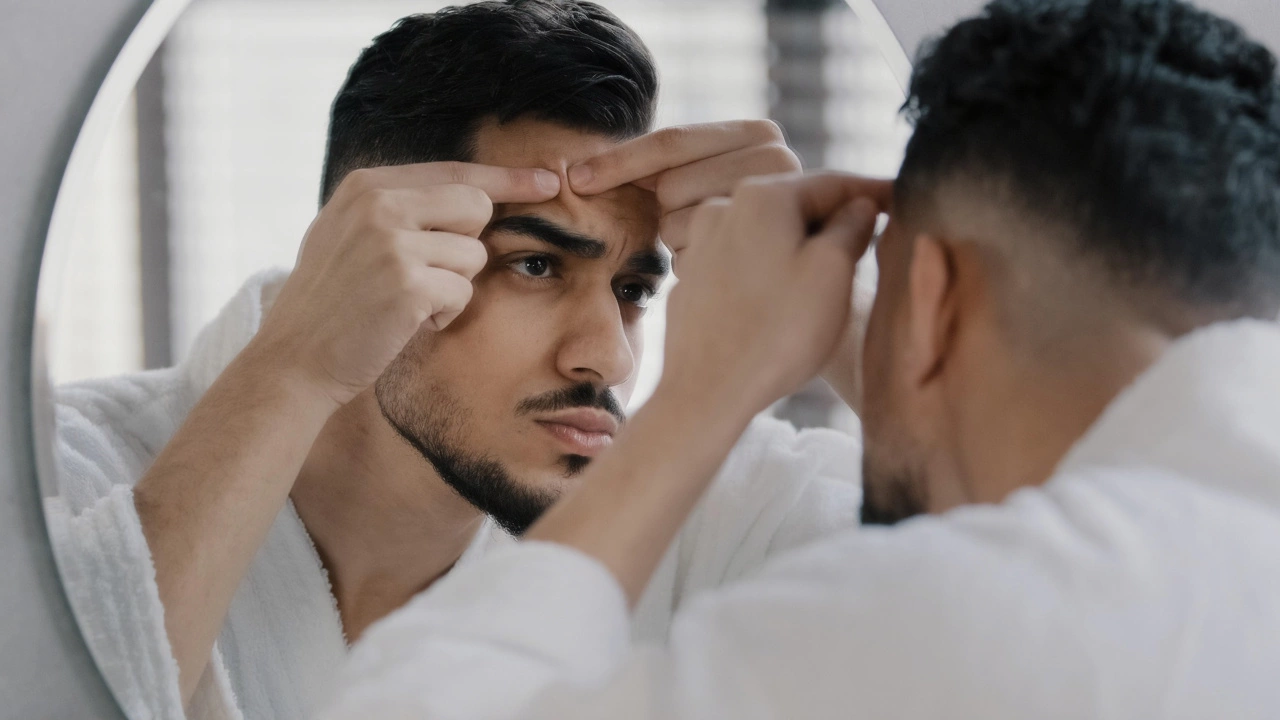
On International Men's Day, November 19, 2025, doctors from India, Jamaica, and the United States sounded an alarm: hormonal imbalance in men isn't just common—it's quietly eroding health, relationships, and longevity. While women’s menopause is widely discussed, men’s equivalent—andropause, or age-related hypogonadism—is still shrouded in silence. According to research published in the New England Journal of Medicine, nearly 30 percent of men over 50 show clinically significant testosterone deficiency. And it’s not just about sex drive. It’s about mood, memory, heart health, and even bone density.
The Slow Leak: How Testosterone Declines After 30
Testosterone doesn’t crash. It drips. Starting around age 30–35, levels drop by about 1 percent per year, as confirmed by the European Male Ageing Study (EMAS) and cited in the Journal of Clinical Endocrinology and Metabolism. That means a man in his 50s may have 20–30 percent less testosterone than he did in his 20s. And yet, most don’t notice until the effects become impossible to ignore.
"It’s not sudden," says Dr. Alok Kumar Jha, Senior Consultant in Urology at Yatharth Super Speciality Hospital in Faridabad. "You start feeling off—tired, irritable, less interested in things you used to love. You blame stress. Or aging. But it’s chemistry. Your brain’s signaling system is slowly breaking down."
Obesity, Fat, and the Broken Feedback Loop
The problem isn’t just time. It’s weight. Dr. Jayesh Amin, Clinical Director of NOVA Wings IVF in Ahmedabad, explains how visceral fat turns into a hormonal saboteur. "Excess belly fat raises scrotal temperature," he says. "That damages sperm production. It also converts testosterone into estrogen—leading to gynecomastia, or breast enlargement. And it disrupts the brain-testes dialogue." The result? Lower LH and FSH, reduced sperm count, and higher DNA fragmentation in sperm—fertility issues masked as "bad luck."
"We see men in their 40s coming in for infertility workups," Dr. Amin adds, "and their testosterone is half of what it should be. They’re shocked. No one ever told them obesity affects sperm like this."
The Mental Toll: When Low T Feels Like Depression
It’s not just physical. Low testosterone directly impacts neurotransmitters linked to motivation and emotional regulation. Dr. Jha describes patients who say, "I used to run marathons. Now I can’t get out of bed." Others report sudden anxiety, brain fog, or a loss of ambition. "It’s not laziness," he insists. "It’s neurochemistry. Testosterone helps regulate dopamine and serotonin. When it drops, so does your drive."
Dr. Shobana Priya S., Senior Consultant at SIMS Hospital in Chennai, says women often recognize these signs in their partners before men do. "Husbands come in because their wives insisted. They say, ‘She says I’m not myself.’ And they’re right."
Why Men Don’t Go to the Doctor
Stigma is a powerful barrier. Many men still view hormonal symptoms as weakness. Others assume it’s "just aging." But the consequences are severe. Untreated hypogonadism is linked to higher risks of type 2 diabetes, cardiovascular disease, and osteoporosis—a condition wrongly labeled "a woman’s disease."
"Testosterone converts to estrogen in bone tissue," explains Dr. Amin. "That estrogen helps maintain bone density. When testosterone drops, so does bone strength. We’re seeing men in their 50s with vertebral fractures—no fall, no trauma. Just low T."
And here’s the kicker: standard male health check-ups rarely test for it. "In women, reproductive hormone panels are routine," notes Dr. Girish, as cited in Business Standard. "For men? Thyroid. Blood sugar. Maybe cholesterol. Testosterone? FSH? LH? Prolactin? You need to ask for them—and then find a specialist who knows how to interpret them."

Global Voices: Jamaica’s Call to Action
Dr. Charmaine Thomas, a Jamaican physician and founder of the Menopause Rebirth Movement, is pushing for a national dialogue. "We talk about women’s menopause like it’s normal," she says. "But when a man says, ‘I’ve lost my edge,’ we tell him to ‘man up.’ That’s not care. That’s neglect."
Her movement has started workshops in community centers, inviting couples to talk about midlife changes together. "When partners understand it’s biology—not betrayal—it changes everything," she says. "Communication improves. Intimacy returns. And men feel seen."
What’s Next? Screening, Not Silence
Experts agree: the solution isn’t hormone replacement alone. It’s awareness. Routine screening. And breaking the silence.
- Men over 35 should consider baseline testosterone testing, especially if fatigued, depressed, or struggling with fertility.
- Primary care doctors need to include LH, FSH, prolactin, and free testosterone in routine panels—not just total T.
- Workplaces should offer midlife wellness programs that include hormonal health screenings.
- Media and public health campaigns must normalize men’s hormonal health like they do women’s.
"We don’t need more slogans," says Dr. Jha. "We need labs. We need conversations. We need men to know: asking for help isn’t weakness. It’s survival."
Frequently Asked Questions
Is low testosterone just a normal part of aging?
While testosterone naturally declines with age, a drop below 300 ng/dL is considered clinically low—and not inevitable. Many men maintain healthy levels into their 70s with proper weight management, sleep, and exercise. When levels fall below that threshold, symptoms like fatigue, low libido, and brain fog become medically significant, not just "getting older."
Can lifestyle changes reverse low testosterone?
Yes—significantly. Losing 10 percent of body weight can raise testosterone by up to 50 percent, according to studies in the Journal of Clinical Endocrinology & Metabolism. Strength training, quality sleep (7+ hours), and reducing alcohol and processed sugar also help restore natural hormone production. But if levels are severely low, lifestyle alone may not be enough.
Why aren’t testosterone tests included in regular check-ups?
Historically, men’s health has focused on heart disease and diabetes, with hormonal screening seen as a fertility or sexual health issue—not general wellness. Insurance systems rarely cover it unless symptoms are extreme. But experts argue this gap leaves men vulnerable to preventable conditions like osteoporosis and metabolic syndrome.
Does testosterone replacement therapy increase cancer risk?
Current evidence from the New England Journal of Medicine and the Journal of the American Medical Association shows no increased risk of prostate cancer in men with normal baseline PSA levels who receive supervised testosterone therapy. However, men with existing prostate cancer or elevated PSA should avoid it. Monitoring is essential—therapy isn’t a free pass.
How does low testosterone affect fertility?
Low testosterone reduces sperm production by suppressing LH and FSH, which are needed to stimulate the testes. It also increases DNA fragmentation in sperm, lowering conception chances and raising miscarriage risk. Men struggling with infertility should get a full hormonal panel—not just a sperm count. Many don’t realize their issue is hormonal, not structural.
What’s the difference between andropause and male menopause?
"Male menopause" is a misleading term. Unlike women’s menopause, which involves a sharp hormonal drop over months, men experience a slow, steady decline over decades. That’s why doctors prefer "age-related hypogonadism." It’s not a sudden event—it’s a gradual shift. But the impact on quality of life can be just as profound.


